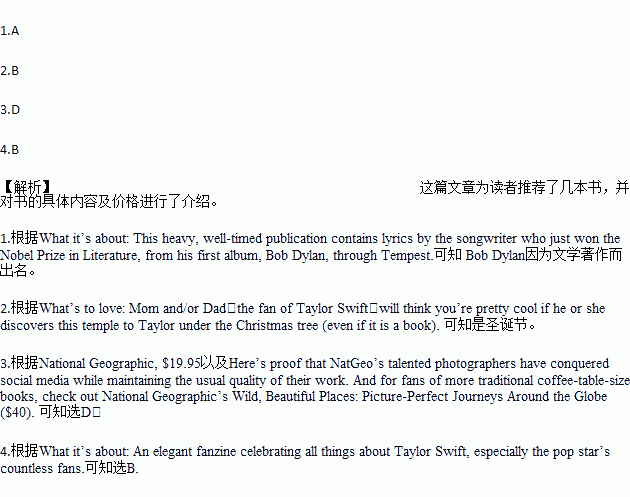题目内容
Goodreads recommends the following books you want to read for the event to come.
1.The Lyrics: 1961-2012
By Bob Dylan
Simon & Schuster,$60
What it's about: This heavy,well-timed publication contains lyrics by the songwriter who just won the Nobel Prize in Literature,from his first album,Bob Dylan,through Tempest.
What's to love: The times may be changing,but Dylan's fans are a constant,traditional devotees who will want this epic collection for their shelves,to sit beside those beloved old large papers.
2.Taylor Swift: This Is Our Song
By Tyler Conroy
Simon & Schuster,$28
What it's about: An elegant fanzine celebrating all things about Taylor Swift,especially the pop star's countless fans. What's to love: Mom and/or Dad,the fan of Taylor Swift,will think you're pretty cool if he or she discovers this temple to Taylor under the Christmas tree (even if it is a book).
3.Misty Copeland
By Gregg Delman
Rizzoli,$39.95
What it's about: Star-figure female ballet dancer Misty Copeland strikes a pose(95,to be exact) in photos taken between 2011 and 2014,in the casual setting of dance studios.
What's to love: Since becoming the first African American woman to be named a principal dancer with the American Ballet Theatre,Copeland has become a cultural phenomenon,and Delman's arresting pictures capture(捕捉)her muscular power and elegance.
4.@ NatGeo: The Most Popular Instagram Photos
By National Geographic
National Geographic,$19.95
What it's about: National Geographic's popular Instagram account(nearly 63 million followers) comes to book form in this title filled with eye-popping images from around the world.
What's to love: Here's proof that NatGeo's talented photographers have conquered social media while maintaining the usual quality of their work.And for fans of more traditional coffee-table-size books,check out National Geographic's Wild,Beautiful Places:Picture-Perfect Journeys Around the Globe ($40).
1.Which author is noted for literature achievements?
A. Bob Dylan. B. Tyler Conroy.
C. Gregg Delman. D. National Geographic.
2.For what event are the books most probably recommended?
A. New Year's Day. B. Christmas Day.
C. One's anniversary. D. Literature awards.
3.How much would a photographer normally spend on his favourite books listed?
A. $39.95. B. $19.95.
C. $59.9. D. $99.9.
4.Which book would a pop star's fan probably buy?
A. The Lyrics: 1961-2012 .
B. Taylor Swift: This Is Our Song.
C. Misty Copeland.
D. @ NatGeo: The Most Popular Instagram Photos.
 名校课堂系列答案
名校课堂系列答案

 B. took turns C. turned out D. looked up
B. took turns C. turned out D. looked up